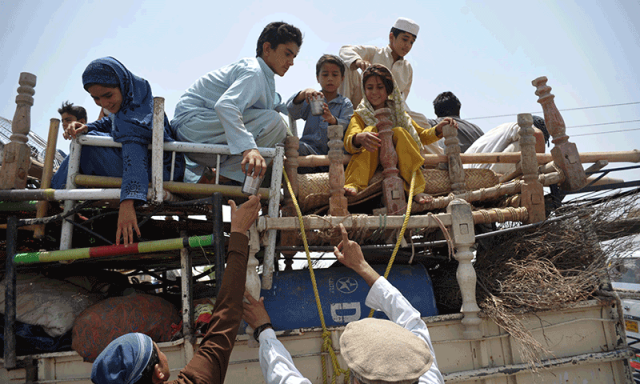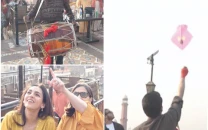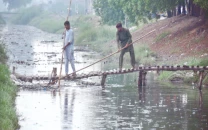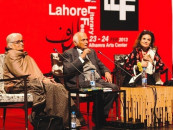In need: IDP from Waziristan seeks help for daughters suffering from thalassaemia
Says he lost all savings as a result of the operation, with nothing left for his daughters’ medical care.

Insafullah’s four little girls long to play with other children outside their house, but their small bodies weakened by a genetic blood disorder, thalassaemia, cannot deal with the physical exertion of running around and playing hopscotch.
The Mir Ali native, who is displaced from North Waziristan due to military operation Zarb-e-Azb, lives in a one-room house in Sarai Naurang, Lakki Marwat with his ailing daughters, four younger brothers and aged father.
Insaf told The Express Tribune on Saturday that six-year-old Mehasin and two-year-old Laiba need blood transfusions every 15 days, while Siddiqua, 8, and Hira Naz, 3, need a transfusion every month.
Making it to safety
“I am the only one who knows how I managed to get my daughters to Lakki Marwat after the bombardment started in my hometown,” said Insaf.
“Throughout the journey to safety, I kept praying that my daughters die on the way. Not because I wanted them to, but because I realised there were dark days ahead and I didn’t want my children to go through them,” he added despondently.
According to Insaf, because his daughters were ill and exhausted from the journey, he chose not to stand in IDP registration queues and instead began looking for a house on rent.
“We are supposed to pay Rs15,000 per month for this small house. I know it’s too much, but I cannot live in tents at the mercy of others with my children being so ill,” he said.
The family’s funds, however, soon ran dry and with no money left, Insaf had to borrow Rs7,500 from a relative in order to procure blood bags and arrange a transfusion.
“Other parents need to provide food for their children. For my daughters, blood transfusion is even more important because that’s what keeps them alive,” said the tribesman.
‘It’s all gone’
Before leaving the restive agency, Insaf owned his own business in Mir Ali Bazaar. “Before the arrival of Ramazan, I spent nearly Rs5.7 million to buy stocks of wheat and sugar for my business. But the operation began and in the blink of an eye the jets bombed and destroyed all my savings. It was all gone,” recalls Insaf.
He added in his hometown, whenever he needed financial aid, he would stand outside the mosque and appeal to the locals. “The people willingly helped me financially and even donated blood, but after the operation and the displacement everyone has their own problems to deal with.”
He said his family is forced to live in deplorable circumstances and if the government is unable to provide him a proper house, the least it could do is to ensure the provision of food and medicines for his daughters.
“The agency’s political administration has turned its back on me. I have visited several government officials to seek help, but no one has paid any attention to my predicament,” added the displaced tribesman.
Insaf demanded the provincial government and the FATA Disaster Management Authority to address his problems and get his daughters admitted to a hospital for proper and timely transfusions.
Passed on
According to the website WebMD, thalassaemia is a genetically inherited blood disorder which affects a person’s ability to produce haemoglobin, resulting in anaemia. There is no cure for the disorder and the patient has to endure blood transfusions throughout his/her life.
A news report published by the APP in 2013 stated that every year an estimated 6,000 children are born with the disease in Pakistan.
Published in The Express Tribune, July 7th, 2014.



















COMMENTS
Comments are moderated and generally will be posted if they are on-topic and not abusive.
For more information, please see our Comments FAQ